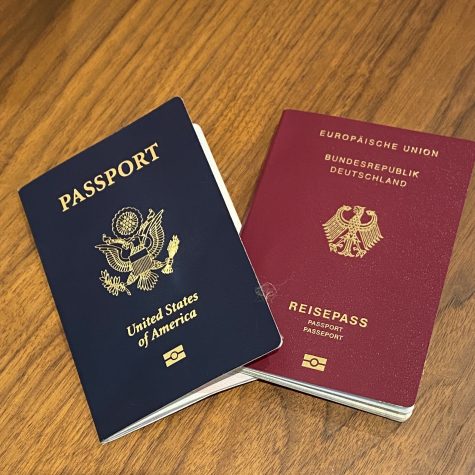Grundgesetz: Article 116(2)
The German Consulate is under construction. Not the Consulate itself, but the building. Oh, and the boulevard it sits on.
I wouldn’t have known that this building housed a consulate — that behind inexpensive and uninteresting doors I would be standing on German soil. Yet, after a three-year process my brother, son, and I found ourselves, three American Jews, sitting in strikingly ordinary lobby chairs as a slender blonde woman handed each of us an Einbürgerungsurkunde, a certificate of naturalization.

I’m very American. My children are American. We speak English in our home and listen to German only when prefaced with der Kinder. We learned pieces of German, Yiddish, and Polish this way. We also learned to curse because we rode in cars with our family, most notably one uncle who might have gotten himself into more trouble had anyone but I understood the filth leaving his mouth.
As a child I assumed our immigrant family left their Germanness in Europe. As I set up my adult homes I recognized quickly that one simply cannot accomplish a task so great. My grandfather would always be a German first and everything else second. Dust did not exist in my grandfather’s home, nor did chaos. Chaos meant things like eating while not seated at the dining room table, canned food labels not aligned and facing forward like soldiers, or roses dropping their petals. My grandparents’ manners were impeccable and reliable, a source of comfort and of bewilderment. How did these people who hopped off trains, butchered cows, and sewed garments refashion into gentlemen and ladies as they entered their apartments?
They were German first, but they were also refugees. I suspect, but do not know, that most of them would not identify as refugees even as they were reunited at DP camps. They talked about cousins and siblings, parents and grandparents, but the family trees are hazy and I have long suspected that after enough time at Sachsenhausen or Buchenwald, your cousin becomes your brother and your neighbor the uncle. I never asked, though, because the histories they created for themselves helped them survive the unthinkable.
Post Traumatic Stress Disorder wasn’t a term we’d hear much until our adulthood. Had a researcher spoken to us, we’d have supplied all necessary anecdotes.
One uncle escaped the camps in his early teens and stole motorcycles here and there until he landed in Spain where he would live, marry, parent, and then die. He once admired my mother’s passport and asked her where she got it. He didn’t believe that anyone in our family had a government-issued passport, nor would they limit themselves to just one. My son couldn’t understand escaping to Spain, “Why Spain?” Why not Spain? He was a 13-year-old on a stolen motorcycle with dead parents and missing siblings. You just run, I suppose.
Survivors always have two exit plans.
They all changed their names. Then they changed their ages so they could work and exist. They got older and needed to retire, so they changed their names back — their ages first. Adolf became Alfie became Adolf again. And the accent. His accent got stronger because when you’re 75 or 80 or whatever age he decided he was, working that hard to pronounce a J wasn’t worth the effort. I would always be Yessica. J made a sound that never came.
My spices are in alphabetical order. I use a label maker on their lids so that the text is uniform. There is one way to eat, it is Continental. Everything else is wrong. This is non-negotiable. One of my children holds their fork improperly, I won’t say which child, but they know. They also know it makes me teeter between rage and shame. This part of parenting that I have failed connects me to that generation. I cannot tell you why is matters so much to me, I wish it didn’t matter. I know only that it does.
That generation in between was always and remains in between. My parents ‘ generation who were born here and there, shuttled from ship to tenement —they straddle these worlds and translate everything for their parents. As children, they translated poorly because knowledge and wisdom come at different moments, and — like the Latinx kids in my own backyard — they know too much. They read their parents’ documents and fill out their tax returns, they tell them what teachers and headmasters have said, they report the news, and they soften blows. They read letters from the tax assessor while their peers read comic books.
That generation shielded their parents, and much like any coat of armor they tarnished and dented. Many remain understandably if not forgivably broken.
And with this — all of this misery — the executions, the escapes, the pillaging, the ruined health, and psychic trauma. Through all of that, we decided, my brother and I, that these passports should be ours. We are Americans, we are the American Dream. We are the children of an immigrant made good, and I have no intention of being anything less than American. We have homes and children, degrees, and careers. We have hobbies and pets, and we give of ourselves to our communities.
No German would look at us and think we are one of them. Culturally we are not, and I doubt sincerely that we could be if we tried.
And now, too, we are German. German Jews, once again, the kind of Jews that reject religion, the type of Jews that religion rejects.
I tell myself I did this for my children. They can now study or work in Europe without a visa. I tell myself I did this because I could, and even I know that is a lie. There’s always a reason just as there are always two escape routes. Perhaps more.